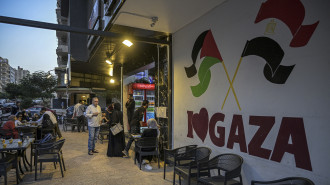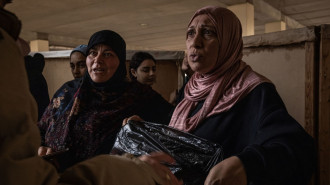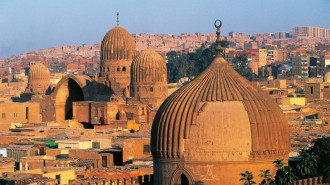8 things you need to know about Ramadan
The holy month of Ramadan sees 1.6 billion Muslims across the world join together in fasting. We go without food and water from when the sun rises to when it sets, and we reflect on what God has given us and what we have done for him and the world.
Ramadan is a time for worship, family, and reflection. It's a time in which we detox from our bad habits in the hope of becoming less reliant on them after the holy month is up. Mosques are usually buzzing with energy and Muslim strangers are more likely to smile at each other and greet each other with peace (as salam-u-alaikum) as we all embark on this month-long journey with the sense of community that we are supposed to feel throughout the year.
It's a struggle and a blessing and it's a time we enjoy, but also dread.
Here are eight things you need to know about Ramadan.
1. We love communal eating once the sun goes down
One of the beauties of Ramadan is that we all come together. Families who may not have the habit of eating at the same time usually come together over the dining table.
Muslims also host community iftars which usually happen at Mosques, parks, or community centres.
One of the largest (and most absurd) myths is that iftars are strictly for Muslims, or that it's rude to eat with people who have been fasting all day. If anything, we welcome more people and love it when non-Muslims share the experience of eating with us, so please come along!
2. Each culture has their own way of doing it
Iftars are usually described with an Arab-centric setting in mind. The first thing that comes to mind for iftars are rice-heavy, meat-based dishes like kabsa (also known as machboos).
Often when people think of desserts, they remember knafeh, the Palestinian celebration of sugar, that has deservedly become a Ramadan staple across the Middle East.
But each culture does iftar differently. Rather than breaking their fasts with milk, in Indonesia, the country with the world's largest Muslim population, fasts are usually broken with coconut water.
A staple Malaysian cuisine is bubur lambok, which is a rice and chicken-based porridge.
In Somalia, shurbad, a thick and creamy oat soup is often served during iftars.
Sometimes, iftars transcend culture. It's a time in which Muslim vegetarians and vegans (yes, we do exist) tend to become even more creative with recipes.
3. Dates are a staple
The Prophet Mohammed broke his fast with dates, making it a sunnah. Muslims across the world continue this tradition.
4. Ramadan TV shows
As much as we like to think we spend our time doing nothing but worshipping, TV is very popular during Ramadan. In the Middle East, special Ramadan TV series are often released, helping Muslims get through the fasting hours.
Read more: TV dramas you don't want to miss this Ramadan
5. Taraweeh prayers
After iftar, some Muslims, depending on which school of thought they follow, take to the Mosques to pray Taraweeh prayers, which are optional prayers that continue through the night.
6. We don't force ourselves when we're unwell
Fasting is not supposed to be a form of torture, nor is it a way to emotionally blackmail using the fear of going to hell. One of the main purposes of Ramadan is to use the time to sustain a healthier lifestyle - and if fasting harms an individual’s body, they're exempt from doing so.
This includes the ill, the elderly, the pregnant, breast-feeding women, people who are on medication and menstruating women.
7. Not everyone breaks their fast at the same time
Breaking your fast depends on when the sun rises and sets in your country - meaning some people fast for six hours a day, while others fast for 20.
The time of breaking your fast also differs per sect. Sunnis tend to break their fast once the sun begins to set, whereas Shias often wait until the sun has set completely before they break their fast.
8. You can (and most likely will) gain weight
Islam promotes living life with a sense of moderation and sustaining a healthy lifestyle. And while Ramadan is also known as a month to detox and to stick to healthy food, due to the types of food that are usually cooked in Ramadan, and the sheer amount of sweets available, weight gain is almost inevitable.
Also, as much as we should, and even plan to do so, who really exercises during Ramadan?
Follow Diana Alghoul on Twitter: @SuperKnafeh

![Palestinians mourned the victims of an Israeli strike on Deir al-Balah [Getty]](/sites/default/files/styles/image_684x385/public/2024-11/GettyImages-2182362043.jpg?h=199d8c1f&itok=xSHZFbmc)


![The law could be enforced against teachers without prior notice [Getty]](/sites/default/files/styles/image_684x385/public/2178740715.jpeg?h=a5f2f23a&itok=hnqrCS4x)
 Follow the Middle East's top stories in English at The New Arab on Google News
Follow the Middle East's top stories in English at The New Arab on Google News


